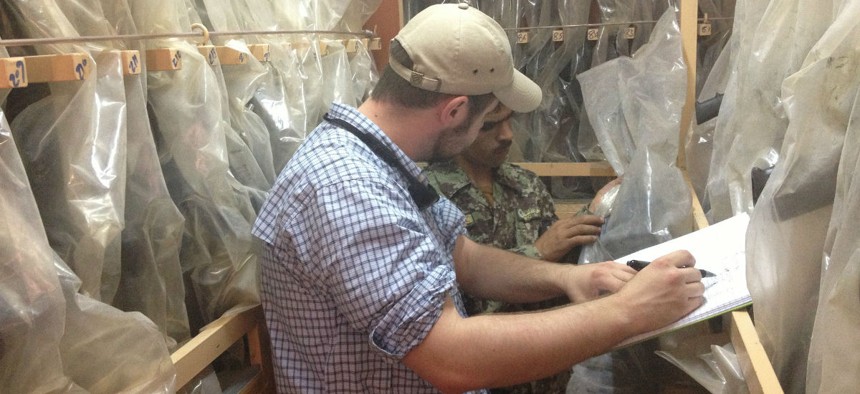
Auditors inspect weapons in Kandahar. SIGAR file photo
As U.S. Presence in Afghanistan Shrinks, So Does Oversight
The special inspector general criticizes the Pentagon for pointless spending and unnecessary secrecy.
Much of the waste and fraud that plagues U.S. spending in Afghanistan can be attributed to local corruption and pressure on U.S. officials to spend money too quickly before their budget authority expires, a top U.S. auditor said on Tuesday, but it’s the diminished American presence in that war-torn country that complicates his job of tracking misspent dollars.
“It’s hard to oversee when you can’t get outside of the embassy,” John Sopko, Special Inspector General for Afghanistan Reconstruction, said at a breakfast with reporters on Tuesday. “Even when we had 100,000 troops, you couldn’t see what was being built,” he said, calling the current 10,000 troops too small to do more than protect commanders from the Taliban. “You can use satellites and other tools, but there’s nothing like having an American there to kick the tires.”
The outspoken Sopko recited a litany of problems: Afghan towns without electricity, schools without teachers, and newly constructed buildings that stand empty. In the overall U.S. effort to rebuild Afghanistan, the “planning was horrible, the execution was horrible,” he said. What’s more, no one has been fired or denied a promotion “for all these screw-ups—there’s no accountability in procurement.”
But the problem lies with the system, not the individuals, he added. “It’s indicative of a bigger problem in how government manages procurement, which goes back to the defense surge” during the Reagan administration, he noted, and has been visible at the Veterans Affairs and Health and Human Services departments.
“We tried to buy Afghanistan a Cadillac but should have bought a Chevy,” he said. “We built things they could not use and never asked about sustainability.” Many program managers told Sopko, “I was under strict instructions to spend my budget,” the IG said, bemoaning expensive “gizmos” such as broadcast towers for public diplomacy where cellphones would suffice. “I’d say, Colonel, instead of giving out $10,000-$15,000 in walking-around money, why don’t you build a power plant?”
Good procurement decisions depend on having accurate numbers—how many soldiers, how many teachers, Sopko said. SIGAR auditors have challenged many of the reported numbers used to justify spending. “The Afghan ministries confirm that they were bogus numbers,” said Sopko, who added that Afghan president Ashraf Ghani reads and uses SIGAR’s reports “to beat up his ministers.”
U.S. commanders at one point declared the Afghan troop numbers classified, but SIGAR succeeded in reversing that decision.
Despite tensions between the Sopko’s office and military leaders, Gen. John Allen, the retired U.S. commander in Kabul, encouraged SIGAR to produce its own “lessons learned” evaluation of the 14-year U.S.-led coalition presence in Afghanistan, the first installment of which should be out by late summer. Unlike the Marine Corps or the State Department, Sopko said, “we are the only agency with a mandate for a whole of government approach.”
He expects the lookback to reflect his own “cautious optimism,” based on the new Afghan government’s “cooperative team that actually wants to do something,” he said. “The prior government didn’t give a squat about waste, fraud and abuse.” The Ghani government, however, “is not perfect, not Kansas or Norway,” Sopko added. “It’s hard to lecture them on procurement reform given some of the things we find here in the United States.”
One discouraging trend: farmers’ increased cultivation of poppies for opium and the growing rate of heroin use among the population, Sopko announced.
Sopko was pleased that on Monday, Sen. Ron Johnson, R-Wis., chairman of the Homeland Security and Governmental Affairs Committee, offered an amendment to the 2016 National Defense Authorization Act reinforcing SIGAR’s independence. It would clarify that the April assignment of the Defense Department IG to oversee aftermath operations in Afghanistan should “not be construed to remove or impede the authority of SIGAR.”
Asked when the Afghan government will be able to stand on its own, Sopko said, “If we left cold turkey, the government would collapse. There’s no financial sustainability, so maybe not in my lifetime.”







